Federal Government Student Loan in Nigeria: How to Apply Easily
Nigerian Education Loan Fund (NELFUND)

Don’t Let Finances Hold You Back from pursuing higher education. This guide will show you the steps you need to follow to get the newly revised Student Loan Act 2024.
What exactly is the Nigerian Government Student Loan?
The Student Loan Initiative is a program established by the Federal Government of Nigeria to break financial barriers in higher education through the provision of interest-free loans to students.
With that being said, it is good to know what exactly it is all about before deepening your legs in it. You might start wondering if it is not another PalmPay loan or loan shark. You might even have fear for the Nigerian government (fear of being lied to). All those fears will be sorted out in this guide; just read and share.

Table of Contents
What is Nigerian Government Student Loan?
The Nigerian government’s student loan is your key to unlocking your educational dreams. This program provides financial support for public universities, polytechnics, colleges of education, and even technical or vocational training! It covers tuition, fees, and living expenses; all you need to focus on is acing those courses of yours. Go for NYSC and get a better paying job.
Under the newly revised Student Loan Act, the Nigeria Education Loan Fund (NELFUND), a corporate body setup by the Federal Government, will be responsible for the disbursement and management of the student loan (with some other government bodies like the FIRS).
Under the same revised student loan act, you will NOT need to provide two guarantors, which include civil servants with at least 12 years of experience, lawyers with at least 10 years of experience after qualifying, judicial officers, and justices of the peace.
Also, under the same revised student loan act of 2024, family income will no longer be a prerequisite for eligibility for the student loan.
Below is the full revised Student Loan Act of 2024.
10 Key Points About the Revised 2024 Student Loan Act in Nigeria:
- NELFUND Established: A dedicated Nigerian Education Loan Fund is created to manage student loans. NELFUND is headed by Mr. Akintunde Sawyerr as Managing Director/CEO, Mr. Frederick Oluwafemi Akinfala as Executive Director, Finance and Administration, and Mr. Mustapha Iyal as Executive Director, Operations
- Loan Coverage Expanded: Financial support goes beyond tuition to include fees, charges, and living expenses.
- NELFUND Funding Secured: A dedicated source of funding is established from federal tax collections. The student loan program will be financed by allocating 1% of all taxes, levies, and duties that the Federal Inland Revenue Service (FIRS) collects and that go to the Federal Government, directing these funds to a General Reserve Fund.
- Family Income No Longer a Barrier: Students from all income backgrounds can now apply.
- Guarantor Requirement Removed: There is no need for guarantors to qualify for a loan.
- Skills Training Included: Funding is available for vocational and technical training programs.
- Parental Loan History Disregarded: Parents’ loan history won’t affect student eligibility.
- Repayment Starts After NYSC: Focus on education first, then repayment begins two years after service.
- Penalties for False Information: Providing false information to secure a loan comes with legal consequences.
- Debt Forgiveness Clause: Loan forgiveness is possible in cases of death or unforeseen circumstances.
Who can Apply for the Federal Government Student Loan?
- Admitted to a Nigerian university, polytechnic, college of education or vocational school (public only)
- Must not have defaulted on any previous loans or been found guilty of any examination malpractice, felony, or drug offenses.
Who cannot Apply?
Below are people who cannot apply for the Federal Government Student Loan:
- Defaulted on a previous loan
- Found guilty of cheating on a school exam
- Convicted of a felony, dishonesty, fraud, or drug offense
- If your parent(s) defaulted on a student loan

How to Apply
Step 1
Register on the Student Loan Application Platform by clicking the “APPLY NOW” button to get started.
Step 2
Proceed to your student loan application, select either tuition/institutional fee, upkeep or both.
Step 3
Your student loan gets approved and disbursed into your school account in minutes.
To get started:
- Visit https://slas.omniswift.com/auth/welcome or https://nelf.gov.ng
Click on ‘Get Started‘ - Next screen, answer the questions about yourself:
N.I.N.,
Date of Birth
Surname - Verify your student status, using:
JAMB Registration Number or BIMs Registration No. (Beneficiary Identity Management Service)
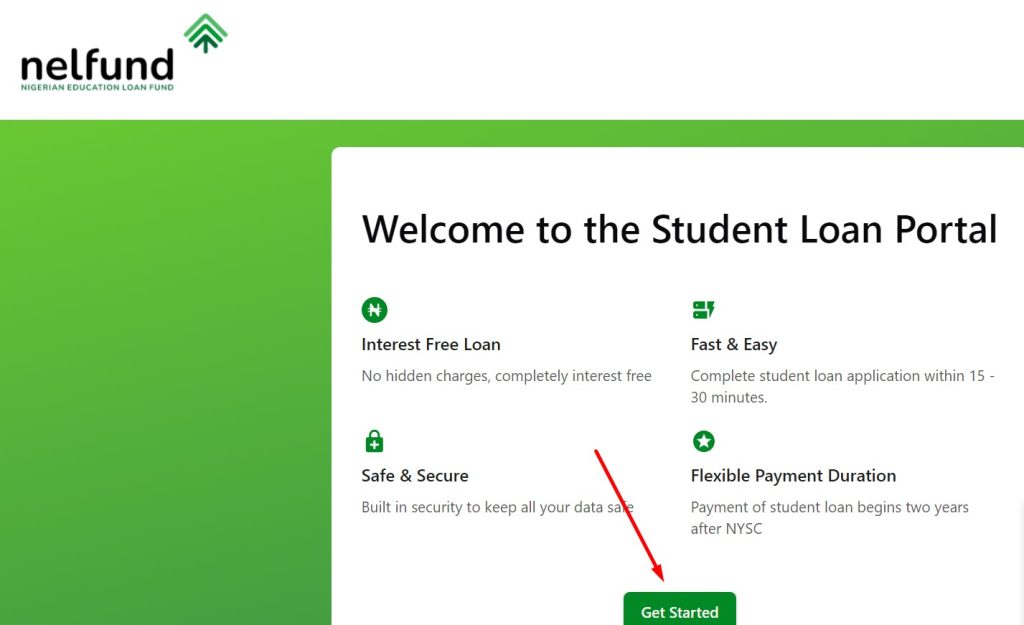
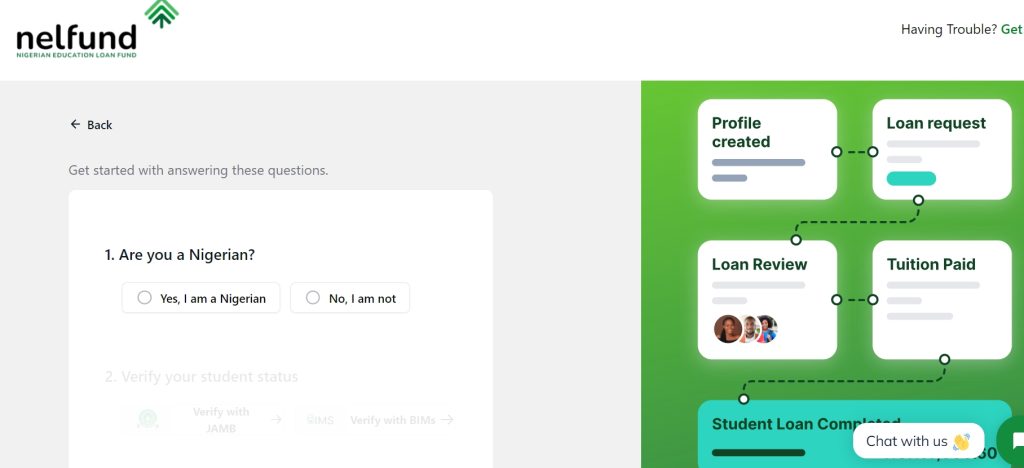
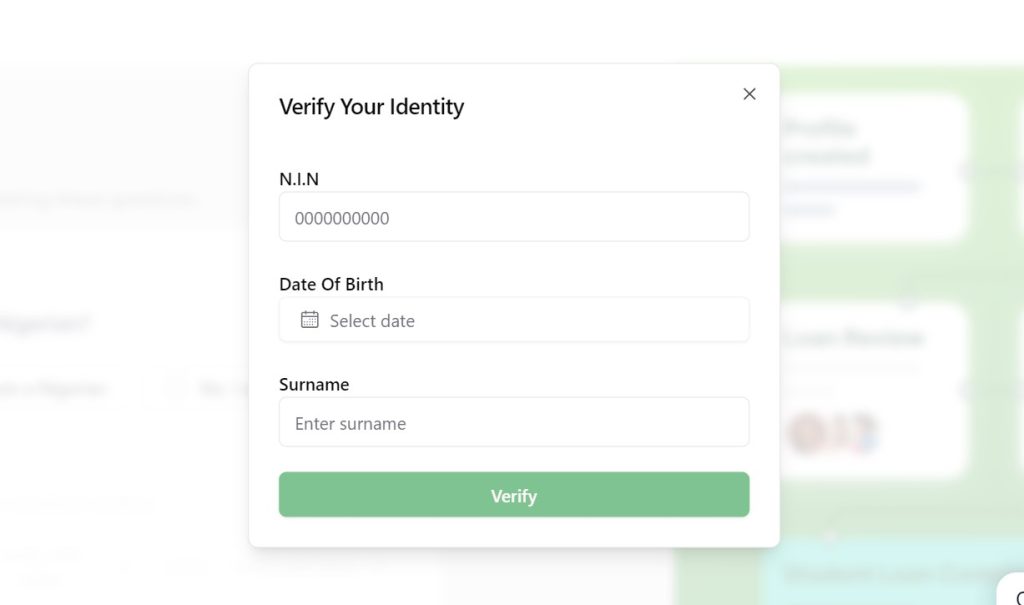
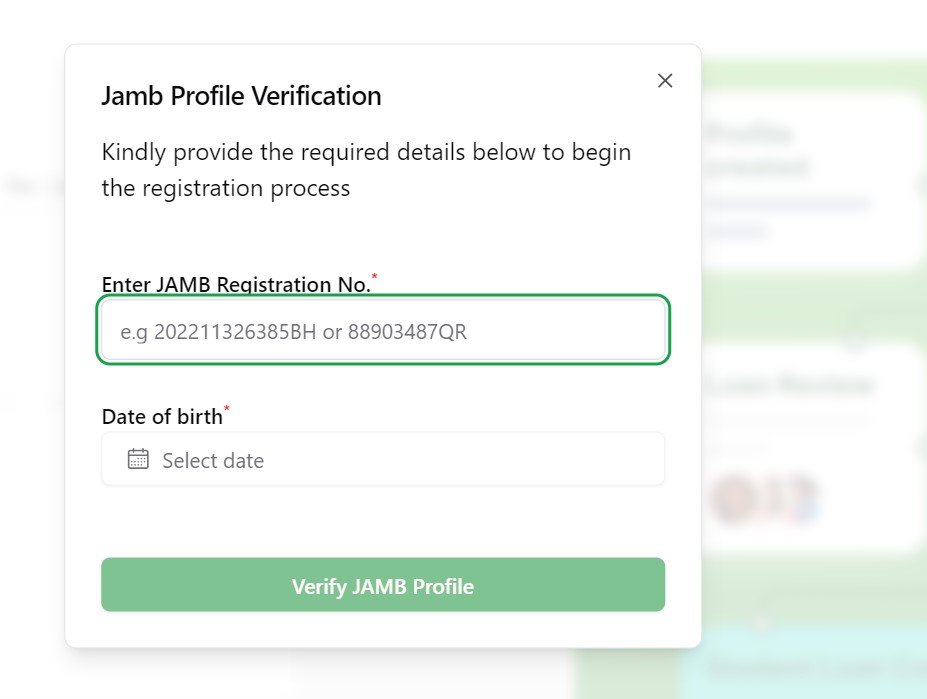
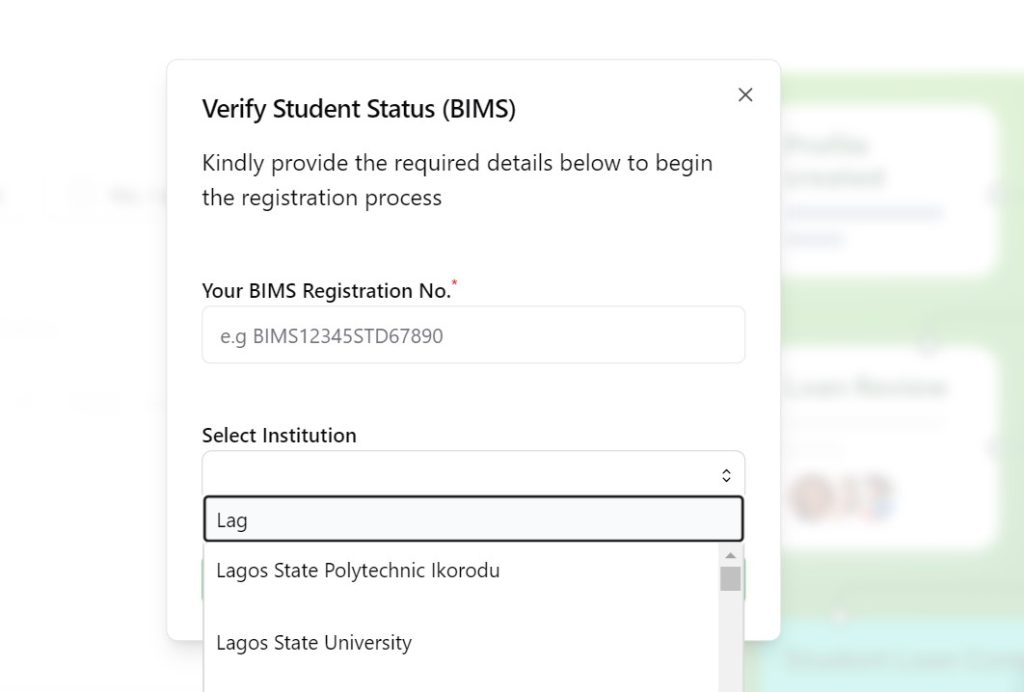
Keep the below details:
- A cover letter from your school signed by important officials.
- Attach required documents:
- copy of your admission letter
- Guarantor letters recommending you for the loan and agreeing to repay if you don’t
- Two passport photos from each guarantor
- Proof of guarantors’ employment (letter and information)
- If guarantors are self-employed, provide business registration details
Required Documents
- A completed application form
- A copy of your admission letter
- A copy of your JAMB result slip
- A copy of your WAEC/NECO result certificate
- A copy of your birth certificate
- A copy of your passport photograph
- A guarantor’s letter of support from each of your two guarantors
- A copy of your guarantors’ employment letter(s)
- A copy of your guarantor’s passport photographs
After You Apply
- The approval process is instant if you are eligible, and your details are correct and valid.
Repaying the Loan
- You don’t have to start paying back until two years after finishing your National Youth Service Corps program.
- Payments will be automatically deducted from your salary (10% of your salary).
- If you are self-employed, you will need to send 10% of your monthly profit to the loan program.
- There are penalties for not repaying the loan.
NOTE: After you follow the above process, the final decision lies with NELFUND.
Frequently asked questions about the Federal Government Student Loan in Nigeria
Who is eligible to apply for the student loan?
Eligibility is based on specific criteria, including admission to a recognised institution (have an active academic profile), a valid BVN (Bank Verification Number) and NIN (National Identity Number), and a valid Jamb record.
What documents are required for the application?
You will need your Admission letter and Student ID Card (optional)
How long does the approval process take?
The approval process is instant if you are eligible, and your details are correct and valid.
Can I apply for living expenses in addition to tuition fees?
Yes, you can apply for an upkeep loan in addition to the institutional fee.
When should I start repaying my loan?
Repayment of your loan starts 2 years after your NYSC and will be deducted automatically from your bank account.
Is there a grace period after graduation?
Yes, you have a 2-year grace period after your NYSC.
What is the maximum loan amount a student can receive?
The maximum loan amount is outlined in the Student Loan Act. It is subject to periodic review by the Special Committee.
Can I apply for multiple loans under this initiative?
Eligible students can apply for upkeep and tuition loans but there is only one application for each loan type.
How does the interest-free aspect of the loan work?
Interest-free means that you will not be charged additional fees or interest on the loan amount. You will only repay the principal amount borrowed.
Can I use the loan for expenses other than tuition fees?
Yes, the loan can cover additional expenses such as living costs (upkeep), as specified in the Student Loan Act.
Can parents apply for a loan on behalf of their child?
No, parents cannot. Eligible students must apply for the loan themselves in accordance with the eligibility criteria outlined in the Student Loan Act. However, parents may act as guarantors if required.
Are there any penalties for early repayment of the loan?
No, there are no penalties for early repayment. In fact, early repayment is encouraged as it helps reduce the overall financial burden.
How are loan repayments made?
Repayments are facilitated through salary deductions arranged with employers. The Nigerian Education Loan Fund coordinates with employers to ensure seamless repayments.
How do I become a guarantor for a student applying for a loan?
You can become a guarantor by providing a letter of recommendation and agreeing to accept liability in case the student is unable to repay the loan.
Can a guarantor be changed after the loan has been approved?
In exceptional cases, a guarantor may be changed, but it would require approval from the Nigerian Education Loan Fund and should be communicated promptly.
Can a parent apply as a guarantor for multiple children simultaneously?
Yes, a parent can act as a guarantor for multiple children, provided they meet the criteria outlined in the Student Loan Act.
Can parents receive updates on the loan status and repayment process of their child?
Yes, parents can request updates from the Nigerian Education Loan Fund regarding the loan status and repayment progress of their child.
Can parents serve as guarantors if they are not Nigerian citizens?
The Student Loan Act specifies that guarantors must be Nigerian citizens, so parents who are not Nigerian citizens would not be eligible to serve as guarantors.
Are there any provisions for loan forgiveness in certain cases?
The Student Loan Act outlines specific circumstances under which loan forgiveness may be considered, such as in cases of permanent disability or death.
How is the effectiveness and impact of the initiative assessed and reported to the public?
The Student Loan Act requires the Nigerian Education Loan Fund to provide regular reports and updates on the initiative’s progress.
Can a guarantor withdraw their support after the loan has been approved?
While possible in exceptional cases, it would require careful consideration and adherence to the processes outlined in the Student Loan Act.
What happens if a student changes their course or institution after receiving the loan?
Changes in course or institution must be communicated to the Nigerian Education Loan Fund for evaluation and approval, as outlined in the Student Loan Act.
How is the Student Loan Initiative funded?
The initiative is funded through government allocations, grants, and contributions from various stakeholders, as outlined in the Student Loan Act.
